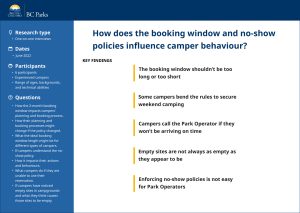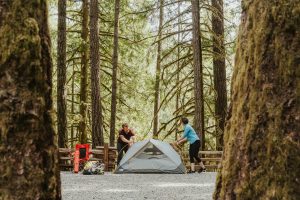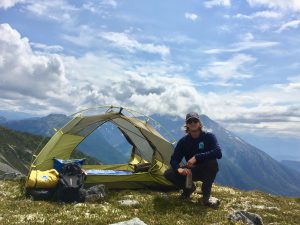Colour the Trails interview with Judith Kasiama
Categories:
By Ratika Sethi, BC Parks co-op student
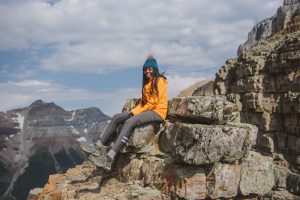
Judith Kasiama is an avid hiker, lover of the great outdoors and an advocate for inclusive representation in outdoor spaces. She founded an organization called Colour the Trails four years ago in Vancouver and is working with brand partners and businesses to break barriers and create outdoor accessibility for Black, Indigenous, and People of Colour (BIPOC).
Participants of Colour the Trails programs can learn new skills in outdoor recreation, receive discounts from local brand partners, and participate in subsidized outdoor adventures.
Judith and I sat down to talk about her experience, as a Black woman in the outdoors, how Colour the Trails came to be, and its vital role in creating accessible outdoor recreation opportunities for BIPOC in British Columbia and Alberta.
Ratika: Judith, thank you for meeting with me today and sharing your experience. Tell me how Colour the Trails came to be?
Judith: About four years ago, I founded Colour the Trails out of my own passion and interest in the outdoors. After graduating university, I was managing a coffee shop in downtown Vancouver while spending free time hiking and being outdoors. I noticed ethnic and racial diversity in people hiking and recreating outdoors, but brands were not showcasing this diversity. For example, when purchasing gear at MEC and other brands, I noticed their media and storytelling only portrayed white families camping and being outdoors.
As a result, I called out MEC for their lack of representation and ended up working there for two years. Although it felt tokenistic at times, it did work in my favor because I became front and centre in diversity and inclusion work. I wanted to create more opportunities for the Black community to be involved with outdoors too.
It started off as Black People Hike Vancouver – however, I expanded to include other identities because I was getting a lot of interest from other diverse communities asking if it is open to include non-Black people of colour. As a result, I rebranded to be more inclusive with the premise of supporting BIPOC as well as the queer community to come and learn outdoor activities in a fun and safe environment. Beginner level at Colour the Trails is for adults who have little to no exposure to outdoor recreation. We are different from other beginner groups, where there is some assumption that people already know the sport or have grown up with access to it. But with Colour the Trails, it’s okay to never have done it at all. We are a supportive space to help break the ice.
When you fall as an adult, there is a sense of embarrassment, but at Colour the Trails that is okay and expected and everyone falls and laughs.
Ratika: Judith, I’m curious, how was your outdoor experience growing up?
Judith: I was born in the Democratic Republic of Congo, which allowed me plenty of access to nature, and I grew up being familiar with enjoying natural spaces by swimming in rivers and climbing trees. I had to leave due to the Congo conflict in the 90s. I moved to South Africa to a more urban setting, then Australia – still lots of access to nature with beaches, surfing and outdoor recreation. When my family and I moved to the US next, we had a more difficult time accessing nature living in a more urban setting. I lived in New York and Boston, where I had more exposure through attending summer camps. In 2010, we moved to Canada as refugees, and I eventually moved to B.C. on my own for university. Here, I was geographically closer to nature and did trail running as a hobby. My friends would say “oh you’re a trail runner” to which I would respond that I didn’t even know that was a specific term!
Ratika: Judith, from your perspective, what do you feel are barriers to access outdoor recreation?
Judith: Not having a car, and only having access to public transit limits access. However, after buying a car once I graduated university, I began exploring outdoors more on my own. In the coffee shop I managed, there were lots of new Canadians and visitors from all over the world and I started inviting them to come hiking with me.
Another barrier I have noticed is that there is little outreach to folks of Colour and Black folks regarding opportunities to work or volunteer in the outdoors. I didn’t know that was an option for work. Now that I do work in this field, I want to tell other BIPOC that they can take opportunities in outdoor recreation and parks related work.
I began to do advocacy work after realizing all of these barriers. I noticed that diversity and inclusion work was not super prevalent in Canada yet, more so in the US. For example, Afro Outdoors and National Brotherhood of Skiers are some groups in the US for BIPOC enjoying outdoor recreation together.
I feel we still have a long way to go with equity when it comes to BIPOC inclusion in parks and outdoor recreation. However, it can be changed if we keep championing for it. BC Parks staff advocating for more inclusion internally makes a big difference.
Ratika: It was so nice talking to you Judith. Thank you for spending time with me today and sharing your story. One last question, what has been your biggest takeaway since you started Colour the Trails?
Judith: A big takeaway was that women leaders are so important even within BIPOC communities, because they spread their knowledge and spread influence to the whole family. Women are a vital part of social change in their communities, so women coming out and being a part of Colour the Trails and witnessing their influence and leadership has been a memorable experience.
Another takeaway is that cost barriers for doing something for the first time with no experience can be high. It’s difficult to spend so much on gear- especially if you don’t know if you will pursue it. It’s different, growing up with adults taking you outside to enjoy the outdoors and providing a safety net and access to equipment to try things. Many adult BIPOC may not get to start their outdoor recreation journey like this. To help overcome this hurdle, Colour the Trails lowers the cost of entry and gives access to try things without having to commit.
Another memorable takeaway is related to community building. I know a woman who started attending Colour the Trails activities and has expanded her friendship group so much after taking part in leading some events. She was a beginner and ended up not just learning, but also making a community for herself. I have found that there are many Muslim women who are interested in outdoor activities, and I know a few who started with us and found a lot of community through Colour the Trails.
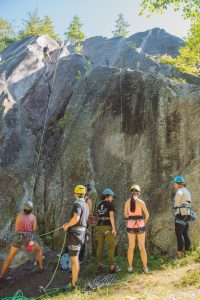
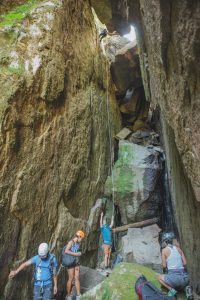
Colour the Trails participants learning how to rope climb outdoors.
Learn more about Judith here.

